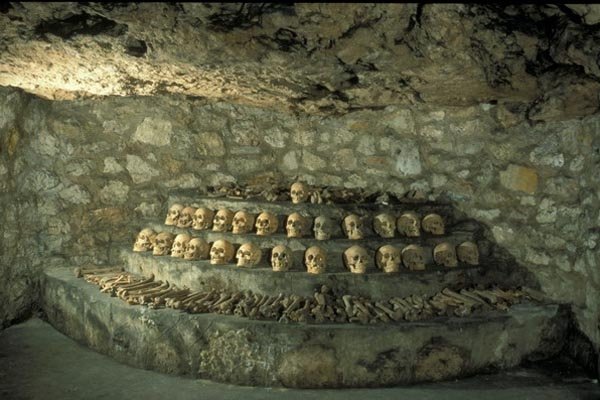
With its rapid expansion, its exploitative methods, its desperate competition, and its peremptory rejection of failure, post-bellum America was like a vast human caricature of the Darwinian struggle for existence and survival of the fittest. Successful business entrepreneurs accepted by instinct the Darwinian terminology which portrayed the conditions of their existence. Businesspeople are not commonly articulate social philosophers, but a rough reconstruction of their social outlook show how congenial to their thinking were the plausible analogies of social selection, and how welcome was the expansive evolutionary opportunism of the Spencerian system. In a nation permeated with the gospel of progress, the incentive of pecuniary success appealed even to many persons whose ethical horizons were broader than those of business enterprise. “I perceive clearly,” wrote Walt Whitman in Democratic Vistas, “that the extreme business energy, and this almost maniacal appetite for wealth prevalent in the United States of America, are parts of amelioration and progress, indispensably needed to prepare the very results I demand. My theory includes riches, and the getting of riches…” No doubt there were many to applaud the assertion of the railroad executive Chauncey Depew that the guests at the great dinners and public banquets of New York City represented the survival of the fittest of the thousands who came there in search of fame, fortune, or power, and that it was “superior ability, foresight, and adaptability” that brought them successfully through the fierce competitions of the metropolis. #RandolphHarris 1 of 21

James J. Hill, another railroad magnate, in an essay defending business consolidation, argued that “the fortunes of railroad companies are determined by the law of the survival of the fittest,” and implied that the absorption of smaller by larger roads represents the industrial analogy to the victory of the strong. And John D. Rockefeller, speaking from an intimate accquaintance with the methods of competition, declared in a Sunday-school address: “The growth of a large business is merely a survival of the fittest…The American Beauty rose can be produced in the splendor and fragrance which bring cheer to its beholder only by sacrificing the early buds which grow up around it. This is not an evil tendency in business. It is merely the working-out of a law of nature and the law of God.” The most prominent of the disciples of Spencer was Andrew Carnegie, who sought out the philosopher, became his intimate friend, and showered him with favours. In his autobiography, Mr. Carnegie told how troubled and perplexed he had been over the collapse of Christian theology, until he took the trouble to read Darwin and Spencer. “I remember that light came as in a flood and all was clear. Not only had I got rid of theology and the supernatural, but I had became my motto, my true source of comfort. Man was not created with an instinct for his own degradation, but from the lower he had risen to the higher forms. Nor is there any conceivable end to his march to perfection. His face is turned to the light; he stands in the sun and looks upward.” #RandolphHarris 2 of 21

Perhaps it was comforting, too, to discover that sociual laws were founded in the immutable principles of the natural order. In an article in the North American Review, which he ranked among the best of his writings, Mr. Carnegie emphasized the biological foundations of the law of competition. However much we may object to the seeming harshness of this law, he wrote, “It is here; we cannot evade it; no substitutes for it have been found; and while the law may sometimes be hard for the individual, it is best for the race, because it insures the survival of the fittest in every department.” Even if it might be desirable for civilization eventually to discard its individualistic foundation, such a charge is not practicable in our age; it would belong to another “long succeeding sociological stratum,” whereas our duty is with the here and now. The reception accorded to Spencer’s social ideas cannot be disassociated from that accorded to the main body of his thought; however some part of his success probably came because he was telling the guardians of American society what they wanted to hear. Grangers, Greenbackers, Single Taxers, Knights of Labor, trade unionists, Populists, Socialists Utopian and Marxian—all presented challenges to the existing pattern of free enterprise, demanded reforms by state action, or insisted upon a thorough remodeling of the social order. Those who wished to continue in established ways were pressed for a theoretical answer to the rising voices of criticism. Said ironmaster Abram S. Hewitt: “The problem presented to systems of religion and schemes of government is, to make men who are equal in liberty—that is, in political rights and therefore entitled to the ownership of property—content with that inequality in its distribution which must inevitably result from the application of the law of justice.” #RandolphHarris 3 of 21

This problem the Spencerian system could solve. Conservatism and Spencer’s philosophy walked hand in hand. The doctrine of selection and the biological apology for laissez faire, preached in Spencer’s formal sociological writings and in a series of shorter essays, satisfied the desire of the select for a scientific rationale. Spencer’s plea for absolute freedom of individual enterprise was a large philosophical statement of the constitutional ban upon interference with liberty and property without due process of law. Spencer was advancing within a cosmic framework the same general political philosophy which under the Supreme Court’s exegesis of the Fourteenth Amendment served so brilliantly to turn back the tide of state reform. It was this convergence of Spencer’s philosophy with the Court’s interpretation of due process which finally inspired Mr. Justice Holmes (himself an admirer of Spencer) to protest that “the fourteenth Amendment does not enact Mr. Herbert Spencer’s Social Statics.” The social views of Spencer’s popularizers were likewise conservative. Youmans took time from his promotion of science to attack the eight-hour strikers in 1872. Labour, he urged in characteristic Spencerian vein, must “accept the spirit of civilization, which is pacific, constructive, controlled by reason, and slowly ameliorating and progressive. Coercive and violent measures which aim at great and sudden advantages are sure to prove illusory.” #RandolphHarris 4 of 21

He suggested that, if people were taught the elements of political economy and social science during their education, such mistakes might be avoided. Youmans attacked the newly founded American Social Science Association for devoting itself to unscientific reform measure instead of a “strict and passionless study of society from a scientific point of view.” Until the laws of social behaviour are known, he declared, reform is blind; the Association might do better to recognize a sphere of natural, self-adjusting activity, with which government intervention usually wreaks havoc. There was precious little scope for meliorist activities in the outlook of one who believed with Youmans that science shows “we are born well, or born badly, and that whoever is ushered into existence at the bottom of the scale can never rise to the top because the weight of the universe upon him.” Acceptance of the Spencerian philosophy brought with it a paralysis of the will to reform. One day, some years after the publication of Progress and Poverty, Youmans in Henry George’s presence denounced with great fervour the political corruption of New York and the selfishness of the rich in ignoring or promoting it when they found it profitable to do so. “What do you propose to do about it?” George asked. Youmans replied, “Nothing! You and I can do nothing at all. It’s a matter of evolution. We can only wait for evolution. Perhaps in four or five thousand years, evolution may have carried men beyond this state of things.” #RandolphHarris 5 of 21

The peak of Spencer’s American popularity probably was reached in the fall of 1882, when he made a memorable visit to the United States of America. Despite his aversion to reporters, Spencer received much attention from the press, and hotel managers and railway agents competed for the privilege of serving him. Finally yielding one synthetic “interview” with the gentlemen of the press, Spencer expressed (it was a slightly jarring note) his fear that the American character was not sufficiently developed to make the best use of its republican institutions. The prospect for the future, however, was encouraging; from “biological truths,” he told the reporters, he inferred that the eventual mixture of the allied varieties of the Aryan race forming the population would produce “a finer type of man than has hitherto existed.” Whatever difficulties the Americans might have to surmount, they might “reasonably look forward to a time when they will have produced a civilization grander than any the World has known.” The climax of that visit was a hastily arranged banquet at Delmonico’s, which gave American notables an opportunity to pay personal tribute. The dinner was attended by leaders in American letters, science, politics, theology, and business. Spencer’s message to this distinguished audience was somewhat disappointing. He had observed, he said, an excess of hurry and hard labour in the tempo of American life, too much of the gospel of work; his friends would ruin their constitutions with exertion. #RandolphHarris 6 of 21

The guests rewarded this appeal against strenuosity with an onerous round of fulsome tributes, which painfully embarrassed even the vain Spencer. William Graham Sumner ascribed the foundations of sociological method to the guest of honour; if the South had been familiar with his Social Statics, Carl Schurz suggested that the Civil War might have been averted; John Fiske asserted that his service to religion were as great as his services to science; and Henry Ward Beecher struck a rather incongruous note at the end of a hearty testimonial by promising to meet him once again beyond the grave. However imperfect the appreciation of the guests for the niceties of Spencer’s thought, the banquet showed how popular he had become in the United States of America. When Spencer was on the dock, waiting for the ship to carry him back to England, he seized the hand of Carnegie and Youmans. “Here,” he cried to reporters “are my two best American friends.” For Spencer it was a rare gesture of personal warmth; but more than this, it symbolized the harmony of the new science with the outlook of a business civilization. The rise of critical reformism in economics and sociology, of pragmatism in philosophy, and of other tendencies that undermined Spencer’s vogue and displaced his ideas—this remains to be treated elsewhere. It is enough to say that, surviving until 1903, he outlived by many years the popularity of his works. In his old age, he was aware that the current of the times was running against his preaching, and a visitor of this period reported finding him “grievously disappointed” at the neglect of his political doctrines, the decline of individualism, and the rise of socialist ideals. “Herbert Spencer was a name to conjure with twenty-five years ago,” taunted a religious observer in 1917. “But how the mighty are fallen! How little interest is shown in Herbert Spencer at the present time!” #RandolphHarris 7 of 21

While it was true that for younger men Spencer’s name no longer carried its old ring of authority, the writer had forgotten that men who were then in their maturity—the publicists, industrialists, teachers, and writers of the governing generation—had spent their youth with Spencer. Whatever had become of Synthetic Philosophy, the mark of his evolutionary individualism was indelible. As late as late as 1915, the Forum had seen fit to reprint a collection of Spencer’s individualistic essays, “The Man Versus the State,” “The New Toryism,” “The Coming Slavery,” “Over-Legislation,” “The Sins of Legislators,” and others, along with commentaries by a galaxy of Republican Party luminaries brilliant enough to dispel all doubt of the vitality of Spencer’s influence among outstanding national leaders. Nicholas Murray Butler, Charles William Eliot, Representative Augustus P. Gardner, Elbert H. Gary, David Jayne Hill, Henery Cabot Lodge, Elihu Root, and Harlan Fiske Stone responded to the editor’s request for contributions by “leaders of thought in America who know the tremendous value of Spencer’s work in our social system.” Hill’s remark that he saw at work in this country the same fatal and illogical procedure that Spencer had been fighting in England, “namely, the gradual imposition of a new bondage in the name of freedom…the increasing subjection of the citizens to the growing tyranny of officialism,” made it clear that the essays were being republished as a manifesto against Wilson’s New Freedom. #RandolphHarris 8 of 21

Long after individualism had become a national tradition, Spencer’s doctrines were imported into the Republic. Yet in the expansive age of our industrial culture, he became the spokesman of that tradition, and his contribution materially swelled the stream of individualism if it did not change its course. If Spencer’s abiding impact on American thought seems impalpable to later generations, it is perhaps only because it has been so thoroughly absorbed. His language has become a standard feature of the folklore of individualism. “You can’t make the World all planned and soft,” says the businessman of Middletown. “The strongest and best survive—that’s the law of nature after all—always has been and always will be.” Man is not required to acquire a perfect character, a complete absence of all faults. In new surroundings or circumstances and under different pressures, new faults may appear. He is required to remove just sufficiently the obstructive conditions within himself. The herd of men are ruled by physical instincts and changing emotions. The aspirant for true individuality must set up higher standards of self-control, personal stability, and harmonious balance. Though man assigns little importance to his thoughts, contrasted with his deeds, their total effect is to dictate his policies which in turn dictate his deeds. If Universal obligations may have to be fulfilled, at least this will not be done in total ignorance. It will be with resignation rather than hatred, and with hope for higher attainment. The habit of always remembering that he is committed to the Quest and to the alteration of character which this involves should help him to refuse assent in temptation and reject despondency in tribulation. #RandolphHarris 9 of 21

We now have a considerable body of knowledge, both clinical and empirical, as to the conditions which, in psychotherapy, foster the process of learning to be free, of becoming oneself. We have found, this experience comes about in a close, warm, understanding relationship in which there is freedom from such things as threat, and freedom to choose and be. From the practical and research information currently available, it seems that a growth-facilitating of freedom-promoting relationship contains at least three significant qualities. When the psychotherapist is what he is, when in the relationship with his client he is genuine and without “front” of facade, openly being the feelings and attitudes which at that moment are following in him, personal change is facilitated. Congruence describes this condition. If appropriate, congruence is the feelings the therapist is experiencing which are available to him, to his awareness, and he can live these feelings, be them, and able to communicate them. No one fully achieves this condition, yet the more the therapist can listen acceptantly to what is going on within himself, and the more he is able to be the complexity of his feelings, without fear the higher the degree of his congruence. Each of us senses this quality in people in many ways. One of the things that offends us about radio, Internet, TV News, and TV commercials is that it is evident from the tone of voice that the announcer is “putting on,” playing a role, saying something he or she does not feel. That is incongruence. Each of us knows individuals whom we somehow trust because we sense that they are being what they are, that we are dealing with the person, not with a polite or professional front. It is this quality of congruence which we sense that research has found to be associated with successful therapy. The more genuine and congruent the therapist has in the relationship, the more probability there that a change in personality in the client will occur. #RandolphHarris 10 of 21

In our case study with Clare something fascinating happened. In the morning paper, a notice about a shipwreck brought back to her that part of her dream in which she had drifted on waves. When she had time to think about this dream, four associations occurred to her. One was a fantasy of a fantasy of a shipwreck in which she was drifting on the water. When a strong man put his arms around her and saved her, she was in danger of drowning. With him she had a feeling of belonging, and of never-ending protection. He would always hold her in his arms and never leave her. The second association concerned a novel which ended in a similar tone. A girl who had gone through disastrous experiences with several men finally met the man she could love and upon whose devotion she could rely. Then she remembered a fragment of a dream that she had at the time she became familiar with Bruce, the older writer who had encouraged her and implicitly promised to be her mentor. In that dream, she and Bruce walked together hand in hand. He was a hero or a demigod, and she was overwhelmed by happiness. To be singled out by this man was like an indescribable grace and blessing. When recalling this dream Clare smiled, for she had blindly overrated Bruce’s brilliance and only later had seen his narrow and rigid inhibitions. This memory made her recall another fantasy, or rather a frequent daydream, which she had almost forgotten though it had played quite a role at college, before the time of her crush on Bruce. It circled around the figure of a great man, endowed with superior intelligence, wisdom, prominence, and wealth. And this great man made advances to her because beneath her inconspicuous exterior he had snesed her great potentialities. #RandolphHarris 11 of 21

If given a break, he knew that she could be beautiful and achieve great things. He devoted all his time and energy to her development. He did not merely spoil her by giving her beautiful garments and an attractive home. Under his guidance, not only at becoming a great writer but also at cultivating mind and body, she had to work hard. Thus, he made a beautiful swan out of someone who had great potential. It was a Pygmalion fantasy, created from the point of view of the girl to be developed. She also had to be devoted to her master exclusively. Clare believed associations expressed a wish for an everlasting love. She believed that every woman wanted this. Because Peter did not give her a feeling of security and permanent love, she recognized that this wish was enhanced. With these associations, without becoming aware of it, Clare touched rock bottom. The special characteristics of the “love” that she craved, she only saw later. Otherwise, the most significant part of the interpretation is the recognition that Peter did not give her what she wanted. As if she had already known it, it is made casually, but it was her first conscious realization of any deep dissatisfaction with the relationship. Therefore, only the conscious facing of problems counts, but also every step taken forward toward this goal. #RandolphHarris 12 of 21

Have you ever felt as if you were being pulled into someone’s story? Maybe you have met someone in your life who could tell you things so vividly it made you see what they were saying in your mind. Their words might have ignited emotions with you. Maybe you could smell the things they were talking about—the fresh bread they spoke of baking. If youy can recall a time like this, then you can safely say that you have been covertly hypnotized. without even knowing, you have been pulled into a place the speaker wanted you. You had not expected to be seeing things so vividly, you had not opened a book or turned on the television, yet there you were, seeing it all unfold. It felt as if you had experienced it with the person, even though you had never left where you stood. When you find yourselfd taking the word of what the speaker is saying, you are not using your own analytical mind. When this happens, your brain takes in what is being said as truth. This is dangerous. Greed can be motivated in two ways: By a physiological imbalance which produces the greedy desire for food, drink, etcetera. Once the physiological need is satisfied, greed ceases, unless the imbalance is chronic. By a psychological imbalance, especially the presence of increased anxiety, loneliness, insecurity, lack of identity, etcetera, which is alleviated by the satisfaction of certain desires like those for food, satisfaction with pleasures of the flesh, power, fame, property, etcetera. This type of greed is, in principle, insatiable, unless a person’s anxiety, etcetera, ceases or is greatly reduced. This first type of greed is reactive to circumstances; the second is inherent in the character structure. #RandolphHarris 13 of 21

The greedy feeling is highly egocentric. Whether it is hunger, thirst, or desire for pleasures of the flesh, the greedy person wants something for himself exclusively, and that by which he satisfies his desire is only a means for his own purposes. When we speak of arousal of pleasures of the flesh in its greedy form where the other person becomes primarily an object, this is obvious. In the nongreedy feeling, there is little egocentricity. Experience is not needed to preserve one’s life, to allay anxiety, or to satisfy or enhance one’s ego; it does not serve to still a powerful tension, but begins precisely where necessity in the sense of survival or still of anxiety ends. In the nongreedy feeling, the person can let go of himself, is not compulsively holding on to what he had and what he wants to have, but is open and responsive. The concept of alienation has its roots in an early phase of the Western tradition, in the thought of Old Testament prophets, more specifically in their concept of idolatry. The prophets of monotheism did not denounce heathen religions as idolatrous primarily because they worshiped several gods instead of one. The essential difference between monotheism and polytheism is not one of the numbers of gods, but lies in the fact of alienation. Man spends his energy, his artistic capacities on building an idol, and then he worships this idol, which is nothing but the result of his own human effort. His life forces have flowed into a “thing,” and this thing having become an idol, is not experienced because of his own productive effort, but as something apart from himself, over and against himself, which he worships and to which he submits. As the prophet Hosea says (XIV, 8): “Assur shall not save us; we will not ride upon horses; neither will we say anymore to the work of our hands, you are our gods; for in thee the fatherless finds love.” Idolatrous man bows down to the work of his own hands. The idol represents his own life-forces in an alienated form. #RandolphHarris 14 of 21

The principle of monotheism, in contrast, is that man is infinite, that there is no partial quality in him which can be hypostatized into the whole. God, in the monotheistic concept, is infinite, that there is no partial quality in him which can be hypostatized into the whole. God, in the monotheistic concept, is unrecognizable and indefinable; God is not a “thing.” Man being created in the likeness of God is created as the bearer of infinite qualities. In idolatry man bows down and submits to the projection of one partial quality in himself. He does not experience himself as the center from which living acts of love and reason radiate. He becomes a thing, his neighbour becomes a thing, just as his gods are things. “The idols of the heathen are silver and gold, the work of men’s hands. They have mouths but they speak not; eyes have they, but they see not; they have ears, but they hear not; neither is there any breath in their mouths. They that make them are like them; so is everyone that trusts in them,” reports Psalm 135. In programs of education aimed at the prevention of mental illness, it would be well to recognize the secondary school as an institution providing an excellent opportunity to reach large numbers of students with instruction in the beneficial principles of mental hygiene. At the early school age, it is more important that they be given sound suggestions as to how to maintain healthy attitudes, how to manage conflicts, and how to deal with strong emotions than it is that they be informed about mental illness. However thoughtful, courses in mental hygiene are not enough. #RandolphHarris 15 of 21

Here is an interesting story from a firefighter we will call Hans Fallada. “When I got called for the fireman’s job, I was sent to the fire department training school to learn all the things you must know to be a professional firefighter. The training school confronts you with a lot of tough situations. They put you in heavy smoke without masks, so you get a sense of what it’s like to be in a terribly hostile environment, one that’s claws around your neck, just squeezing and squeezing. You get an understanding of what it’s like to work in complete darkness, where you’re totally blind. This is what it’s like to be in a burning building, you learn. You’re also taught many other things. You learn how to use the equipment, the fire trucks, the Halligan tool (it’s a pry bar with a form on one end and a point and adz on the other), the axes, the claw tools, and hooks. You’re taught how to use hoses and nozzles, how to stretch hose, hump hose, pack hose. You learn the science of fire. You learn how fire travels. You learn the various kinds of building construction. You know what kind of windows to expect in different buildings, and you know how to deal with those windows and whether to break them or not. In a way, it’s like studying to be a lawyer or a doctor. In law school, the student studies law books, goes through mock trials, and says, ‘Hey, I really know what I’m doing.’ Then he finds it’s a lot different when he’s in an actual courtroom. The medical student studies chemistry, physiology, anatomy, and how to use a scalpel. But once he gets into an actual operating room, it’s different—suddenly people’s lives are at stake. It’s no longer an academic confrontation. It’s right now. #RandolphHarris 16 of 21

“It’s the same thing with a firefighter. You learn all these things in training school so that when you are out in the field in an emergency situation, you know where to go and what to do, so that your actions will be effective. Here I was, a trained firefighter. I got assigned to a firehouse in Sacramento. The men I worked with there were great guys, what we call stand-up guys. They had fast lips, they could get around any situation with their mouths when they couldn’t do it with their dukes. You meet all kinds of personalities in a firehouse. They’re all fundamentally good guys who care about other people. That, in my opinion, is what sets them apart. That’s not to say that you have a room full of Francis of Assisi types figuring out how they’re going to help the poor. But in an emergency situation they care about what happens to people. I got to the firehouse, met these guys. Then, of course, the alarm started ringing. So I went through a few alarms. Mayve it was a false alarm, a garbage pail on fire, a car accident, maybe somebody went out to get a paper and left the soup on the stove. All kinds of things can happen. I remember the first fire. Not really a great fire, but there were a couple of things that happened that day that stick in my memory. The area outside the firehouse is called the apron. When the fire trucks are coming out, two firemen are out there stopping traffic. In those days two firemen rode on the back step of the fire engine. We don’t do that anymore because it’s unsafe. I remember being on the back of the rig, it’s two in the afternoon and I’m putting on my coat, with one arm in the D-ring hanging there like a subway strap. #RandolphHarris 17 of 21

“The truck is stopped momentarily, waiting for the traffic to halt. I look up, and who walks by but a priest from St. Mary’s parish up by 818 N street. He looks over, and he blesses me and the guy beside me on the back of the truck. Now, the other guy may be an atheist for all I know, but I have this priest blessing me, so I make the sign of the cross, a conditioned response like a dog salivating to a stimulus. We get going, and I’m thinking, ‘What’s going on here? I’m just doing my job, and this priest is blessing me on the sidewalks of the City of Sacramento.’ I guess in his head he’s saying, these guys have a tremendously tough job and they might me in a bit of trouble, so I’ll bless them. But at that point I don’t want anybody reminding me that I might be in trouble. All i know is that I’ve been blessed, and that we are going to this alarm. From blocks away I could smell the wood burning. It has a particular smell, not like a car fire, for instance, which has a heavy smell of plastic and rubber. This was a two-story frame building in a row of houses typical of that area of Sacramento, generally lived in by working-calls people. The first thing I thought of, what every firefighter thinks of, was: ‘is there anybody inside, how bad is the fire, and what is the immediate thing to do?’ One of the saving things about being a trooper in a way is that there is leadership you can rely on, and in the fire department we have a lieutenant or a captain on every truck. I was probably with the captain, because I was a probationary firefighter, and they always put a probie with the captain so the captain can keep an eye on on him and assess his performance. The captain has to make reports and decide whether he wants to keep him or transfer him after six months. #RandolphHarris 18 of 21

“I’m in an engine company, and the captain says, ‘Okay, stretch a two-and-a-half-inch line.’ This tells us it’s a serious fire, because for a small fire you stretch a smaller line. This was the way we were trained. So we stretch the hose into the building, and I’m still thinking that I’m probably in better shape than the others because I was blessed. The ladder company arrives, and they immediately go in and do a search. I don’t remember anybody being caught in the fire, maybe somebody was, but it didn’t matter to me at the time. I had my job to do. We’re on our stomachs, crawling into this fire, and I’m humping, pulling, this gargantuan snake of a hose filled with water. Fifty feet of it weighs ninety pounds when it’s dry, so you can imagine how much it weighs when it’s filled with water. There is black, dense smoke, and we can’t see an inch in front of us. There’s a red glow in the background, and we’re pushing toward it. Without masks. Making it a “snotty” fire, that’s one where for every square inch of smoke you ingest a square inch of something else comes out through your eyes, nose, and mouth. The red glow is in the back of the building, and we learn later that the fire has gone out through the back windows and is shooting up to the afternoon sky. We’re on our stomachs, the guy on the nozzle, myself, and the captain behind me, advancing slowly into the fire. Then all of a sudden, this big guy, another firefighter, comes in and jumps on top of the hose, he grabs it from the hands of our nozzle man, and he runs with it in a crouch toward the red glow. Apparently we’re not moving fast enough for him for some reason. #RandolphHarris 19 of 21

“None of us have smoke masks or SCBAs [self-contained breathing apparatus], so we’re all choking. Then we start cursing, ‘Hey, what the (expletive) is this guy doing?’ And our nozzle man goes running after the guy, following the string of hose that’s dancing in front of him. This big guy pulls up maybe fifteen feet, throws himself on the floor, opens the nozzle, and hits the ceiling. The red glow darkens to blackness. He has stopped the fire. It’s amazing, you can have a whole big room on fire, and a two-and-a-half inch hose will put it out in twelve seconds. My captain was really mad. He said, ‘What the (expletive) are you doing?’ And the guy said, ‘Listen, I got the job done, right?’ Well, the captain let it go. I didn’t say anything because I was new on the job. But I felt that this was our line and our hose, and our territory had been infringed on. Later I heard about the old-time firefighters in Sacramento back in the nineteenth century, when territory was the main thing and there was competition between one firehouse and another. When an alarm came, they’d send one firefighter ahead with a barrel while they got the horses and everything else ready, and he’d slip the barrel over the fire hydrant. And if another gang tried to use it, he’d fight them off. They’d have big fistfights over this hydrant, because the first fire of mine I just knew that somehow we should have put out the fire, particularly, I suppose, in view of the fact that I was well protected by the blessing. What I learned is that it is your job to control the nozzle, and that every fire is a personal confrontation. This is your job, and you have to go in there and put the fire out, and a lot of people are watching you to be assured that the fire is being put out. #RandolphHarris 20 of 21

“Firefighting is a highly coordinated job. You don’t begin ventilating a building, for instance, opening windows or doors or breaking windows, until there is water in the hose and the water is shooting out of it. Then you operate in a mathematically correct way. What you’re doing is creating pressure inside the room, and the pressure has to have some way of being released, so you break some windows. This is called ventilation. Otherwise, you have the energy of the fire and the energy of the water shooting from the hose, and you have nowhere for all this energy to go. It will just blow back at you toward the door you came in, where there’s oxygen. That is what creates flashovers fires, when the fire and heat search for oxygen and the fire flashes as it consumes the oxygen. I carried that lesson with me for the rest of my life. The hose is your job, and you have to do the job. If you don’t do it and somebody else does, that’s hard to live with.” Please be sure to donate to the Sacramento Fire Department. I pledge allegiance to the flag of the United States of America, and to the Republic, for which it stands, one nation, under God, indivisible with liberty and justice for all. Forsake not wisdom, and wisdom will preserve you; cherish it, and it will keep you. Enter not the path of the wicked, and walk not in the way of evil men. Avoid evil, turn away from it and do good. Now, therefore, hearken unto wisdom, for happy are they that keep its ways. He who find wisdom finds true life, and obtains favour of the Lord. It is not the place that honours the man, but the man that honours the place. Do not consider yourself a gaint, and your neighbour, small as a locust. He who covets things that are not rightfully his, will not only be disappointed in his wish, but even lose the things that belong to him. #RandolphHarris 21 of 21

The Winchester Mystery House

One afternoon in December of 1890, at about one o’clock in the afternoon, Mrs. Winchester was sitting with three of the servant’s children in the Venetian Dining Room. She was reading to them. She rang the annunciator for the parlour-maid, when the door opened, Mrs. Winchester looked up. “I saw the figure of a woman come in and walk up to the side of the table,” she recollected. “She stood there a second or two, and then turned to go out again, but before reaching the door she seemed to dissolve away.” Mrs. Winchester described her as a “blue, short-looking woman” dressed in a blue muslin. “I hardly saw the face,” she added, “which scarcely seemed to be defined at all.” It is interesting that none of the three children saw her, and Mrs. Winchester only mentioned the event to Mr. Hansen, one of the carpenters who lived on the estate.

In the succeeding two months two servants saw the same figure in a blue dress in other rooms of the house; one saw her in the daylight, and one saw her in candlelight. Neither servant was aware of Mrs. Winchester’s own experience. The two young women had become accustomed to the “noises” within the house, but the experience of seeing the lady in blue prompted one of them to give her notice. Mrs. Winchester suffered from other manifestations. On one occasion she glimpsed a ball of brilliant light within an otherwise darkened room. She felt an icy wind in a closed room. Then the strange incidents seemed to subside, and from 1891 onwards, the strange events became more serious.

Please come and enjoy a delicious meal in Sarah’s Café, stroll along the paths of the beautiful Victorian gardens, and wonder through the miles of hallways in the World’s most mysterious mansion. For further information about tours, including group tours, weddings, school events, birthday party packages, facility rentals, and special events please visit the website: https://winchestermysteryhouse.com/

Please visit the online giftshop, and purchase a gift for friends and relatives as well as a special memento of The Winchester Mystery House. A variety of souvenirs and gifts are available to purchase. https://shopwinchestermysteryhouse.com/




